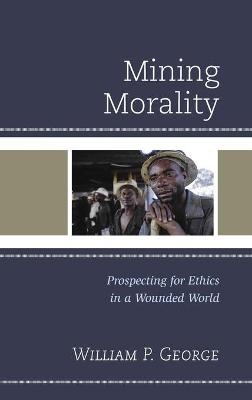
Mining Morality
Prospecting for Ethics in a Wounded World
Seiten
2019
Lexington Books/Fortress Academic (Verlag)
978-1-9787-0792-4 (ISBN)
Lexington Books/Fortress Academic (Verlag)
978-1-9787-0792-4 (ISBN)
In this book, William P. George examines both the morality of mining – what’s good and not so good about resource extraction – and the mining of morality, thereby bringing mining closer to the center of personal and collective moral consciousness.
Employing “self-sharpening tools” found in the work of theologian and philosopher Bernard Lonergan, Pope Francis’ encyclical Laudato si’, and international law, William P. George brings mining to personal and collective moral awareness by “prospecting for ethics” at selected sites: (1) Butte, Montana, “the Richest Hill on Earth,” once bound to Chuquicamata, Chile, by a company that spanned two continents and nearly owned a state; (2) the tiny island nation of Nauru, called Pleasant Island until it was devastated by phosphate mining and the breaking of a sacred trust by foreign powers; (3) the deep seabed, governed by the United Nations Law of the Sea, a “constitution for the oceans” that regards much of the resource-rich seabed as humankind’s “common heritage”; (4) Africa, with its uranium mines but also its conflicts over what “being nuclear” means in the wake of colonialism, apartheid, and Hiroshima; and (5) mineral-rich asteroids, speeding through space, where mining rights are contested, even as space entrepreneurs look to become the world’s first trillionaires.
George introduces readers to remarkable moral miners––the women of Butte and Chuquicamata, a World Court judge from Sri Lanka, the Rocket Boys of Coalwood, West Virginia, to name a few––and leads them to consider not only the morality of mining––what’s good and not so good about resource extraction––but also the mining of morality, a venture that Socrates called “the examined life.”
Employing “self-sharpening tools” found in the work of theologian and philosopher Bernard Lonergan, Pope Francis’ encyclical Laudato si’, and international law, William P. George brings mining to personal and collective moral awareness by “prospecting for ethics” at selected sites: (1) Butte, Montana, “the Richest Hill on Earth,” once bound to Chuquicamata, Chile, by a company that spanned two continents and nearly owned a state; (2) the tiny island nation of Nauru, called Pleasant Island until it was devastated by phosphate mining and the breaking of a sacred trust by foreign powers; (3) the deep seabed, governed by the United Nations Law of the Sea, a “constitution for the oceans” that regards much of the resource-rich seabed as humankind’s “common heritage”; (4) Africa, with its uranium mines but also its conflicts over what “being nuclear” means in the wake of colonialism, apartheid, and Hiroshima; and (5) mineral-rich asteroids, speeding through space, where mining rights are contested, even as space entrepreneurs look to become the world’s first trillionaires.
George introduces readers to remarkable moral miners––the women of Butte and Chuquicamata, a World Court judge from Sri Lanka, the Rocket Boys of Coalwood, West Virginia, to name a few––and leads them to consider not only the morality of mining––what’s good and not so good about resource extraction––but also the mining of morality, a venture that Socrates called “the examined life.”
William P. George is emeritus professor of theology at Dominican University.
Part I: Getting Ready
Chapter 1: Introduction: Mining and Moral Consciousness
Chapter 2: Assembling the Prospector’s Tools
Part II: Prospecting for Ethics on Earth and in Outer Space
Chapter 3: Butte, Montana: “The Richest Hill on Earth” and a Moral Morass
Chapter 4: Nauru: From Pleasant Island to Phosphate Plunder
Chapter 5: Seabed Mining: From Insight to International Law
Chapter 6: Uranium Mining and Its Ends: A Matter of Being and Time
Chapter 7: Asteroid Mining: Ethics for Aliens or for Us?
Part III. A Prospector’s Report
Chapter 8: A Brief Ethical Prospector’s Report
| Erscheinungsdatum | 31.10.2019 |
|---|---|
| Sprache | englisch |
| Maße | 161 x 227 mm |
| Gewicht | 699 g |
| Themenwelt | Geisteswissenschaften ► Philosophie ► Ethik |
| Geisteswissenschaften ► Religion / Theologie | |
| Naturwissenschaften ► Biologie ► Ökologie / Naturschutz | |
| ISBN-10 | 1-9787-0792-4 / 1978707924 |
| ISBN-13 | 978-1-9787-0792-4 / 9781978707924 |
| Zustand | Neuware |
| Haben Sie eine Frage zum Produkt? |
Mehr entdecken
aus dem Bereich
aus dem Bereich


